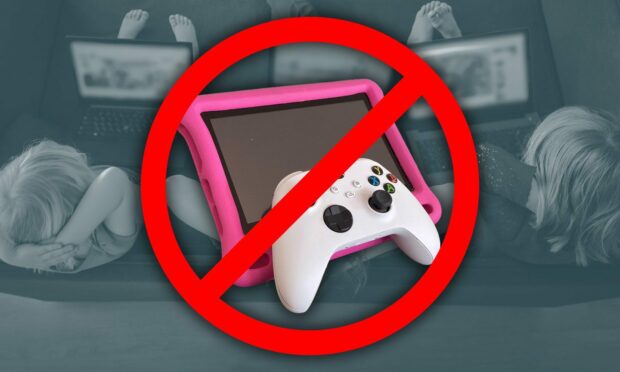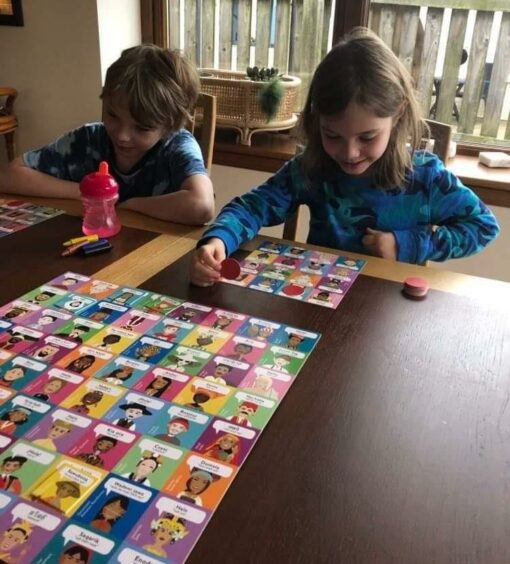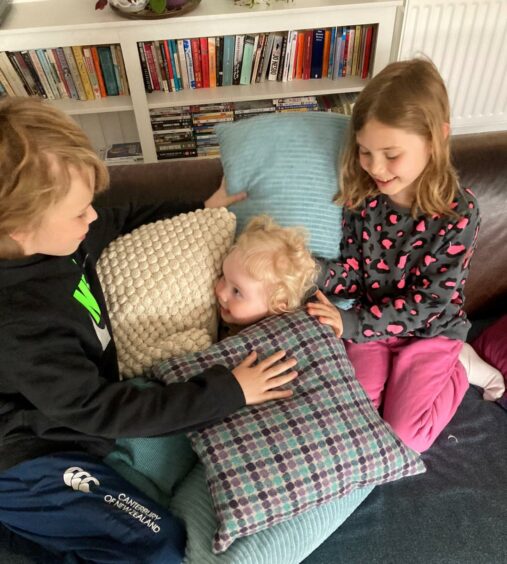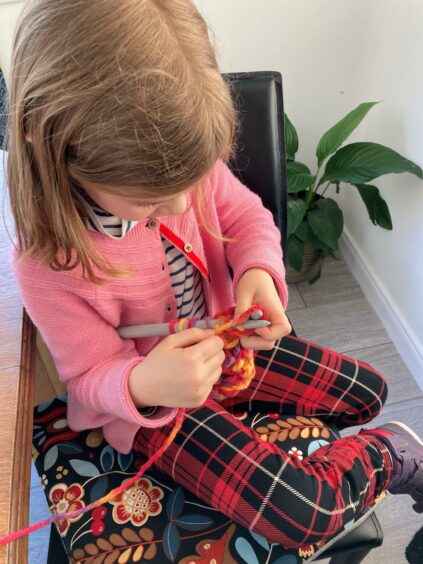How long can your child go without screen time?
Smartphones and tablets are unavoidable for adults, given it’s how we pay our bills, do our shopping, and communicate with others.
But screen time has become a growing issue for children, with many youngsters seemingly unable to drag themselves away from their devices.
Not least my own children. So, to mark Screen-Free Week (May 2 to 8), I set them the challenge of going a week without screen time.
Any screen time. No TV, no tablet, no Xbox, no phone, nothing.
How do they usually spend their time?
Xbox is the screen of choice for my oldest, 11-year-old Johan. A quick bite to eat after school and into his room he goes.
I console myself with the fact that he’s usually playing with friends – I can hear him chatting to them on his headset. That counts as socialising, right?
But deep down I know he spends too much time on it. And weekends can be a particular issue if we’ve got nothing planned.
When there’s nobody online, he’ll sit and watch videos on his tablet. He has a phone but it’s an old-school brick rather than a smartphone. That’s one battle I’m winning.
Ilse, 8, isn’t as much of a gamer but loves her tablet. She can happily while away hours in her room watching videos or playing games on it. Away from the tablet, she can find it hard to tear herself away from the TV.
So how did it go?
The build-up
This is where I thought it would go pear-shaped before it had even begun.
I knew the prospect of a screen-free week would be a shock to their system, and half-expected a blank refusal.
Spoiler alert: Here Ilse gives her hot take on the experiment.
However, using all my powers of parental persuasion and diplomacy, I got them on board. For Ilse, the prospect of getting her picture in the paper was enough.
Johan proved harder work, and I’m sorry to say I agreed to Domino’s pizza upon successful completion of a full screen-free week.
Day One – board games and Brownie runs
Johan went out with friends after school, after spending some time playing with Edith (his 19-month-old sister, not involved in the challenge) and telling us about his day – something which can be akin to drawing water from a stone.
Ilse was her usual self, but spending noticeably more time with Mum and Dad. The three of us played a board game, for the first time in what seems like a very long time.
In the evening, Johan asked if he could come with me to pick Ilse up from Brownies. Something he has never shown the slightest interest in doing before.
Usually he just nods when I tell him I’m picking his sister up, while not taking his eyes away from the Xbox.
He even came up with the idea of hiding under a blanket in the back seat and scaring his sister when we got home.
‘Less screen, more imagination’, I thought.
He already seems more talkative, and my wife and I both remarked that he seems to be taking more interest in us and what we’re doing.
“See you on Day Two,” he said before going to bed. He seems to be all-in, but I know my son, and know that a week is a long time in the life of a pre-teen.
Day Two – kids playing well together. Dad being sneaky
Johan and Ilse are noticeably more sociable with each other, and with us. Not only are they playing with each other more than they have in ages, they’re playing more with little Edith.
Scouts took some pressure off Johan in the evening. I sneaked in a game of FIFA on his Xbox while he was away.
Day Three – entertaining themselves, can it last?
The weekend, and with no school to distract them — the hardest part of the challenge.
Noticeable that Johan is coming up with ideas for things to do, and also involving Edith in his plans.
Normally, he would claim to be bored and react unenthusiastically to my suggestions of things to do. But he seems to be more proactive and positive.
Ilse is also coming up with more ideas herself. It’s as if their imaginations are coming to life, having lain dormant behind screens.
They’re both spending a lot more time in the garden, sitting chatting on the trampoline.
I notice Johan doing things like picking up books around the house and reading them, which he didn’t do before.
There’s definitely a lot more conversation around the dinner table, and they’re both staying at the table longer after they’ve finished eating. Johan hangs around to play with Edith while I tidy the kitchen, which is a great help. Previously, he’d have gone straight back to the Xbox.
I notice small bursts of positivity everywhere. For example, the new trainers Johan got from Santa at Christmas, and which he’d refused to wear because they were “uncomfy”, are now getting an airing.
“I just need to wear them in.”
Ilse’s at a birthday party in the afternoon. The sun’s out, and I come downstairs to find Johan reading in the garden. A long time since I’ve seen that.
We play catch in the sun for a good couple of hours. Also a long time since we did that. He goes out with friends later.
A bugbear my wife and I have is that there’s often an expectation from the kids that it’s our responsibility to entertain them. This seems to have disappeared.
Day Four – the first wobbles
Sunday, and the first wobble from Johan. I try and break down the days into chunks for him, explain that if he can get through the weekend then he’s done the hardest part.
I have to go to the dump and then the supermarket. Ilse wants to come. Quite a nice insight for her into some of the boring jobs we grown-ups have to do.
I get back to find Edith has had a bath – my wife informs me that Johan was excited about helping out. Which he hasn’t been since Edith was a newborn and still had novelty value.
Later I discover Ilse knitting — a new skill she learned a while back but which I hadn’t seen her doing for some time.
Another wobble from Johan before bed time. “It’s so hard!”
I realise for the first time that the Domino’s bribe might not have been such a bad idea. It feels like without it, this might be the point where he’d pull out.
Day Five – ‘only 59 hours and 11 minutes to go’
An unexpected outcome of this challenge is that, despite not being part of it, Edith seems to be losing interest in screens. She’d normally watch a bit of TV, or a toddler app, but now seems positively disinterested whenever we try and plonk her in front of a screen for 10 minutes while we get stuff done in the kitchen.
Conversation around the dinner table continues to be longer – and deeper.
A couple of years ago I bought an illustrated book of Greek myths on a good-intentioned whim. It’s lain on the shelf unopened ever since, but today the kids noticed it and asked if I’d read to them.
I’ve fallen out of the habit of reading to them since they learned to read themselves, so it felt like a bit of a nostalgia trip. But to my surprise they loved it, and now want me to read from it every evening.
If you’d asked me a week ago if they’d be asking me to read to them, I’d have laughed.
Even if I was reminded that there’s “only 59 hours and 11 minutes to go”, I’m genuinely amazed at how well they’re coping.
Day Six – the home straight
Both kids came back from school excited about their new term projects – Space and India respectively. “Guess how many moons Jupiter has?”
I was left in peace to finish my working day as they got cracking on some homework related to their projects.
They were out in the garden all evening until bed time – this would usually be prime screen time. They seem to understand more and more that at their age it’s largely up to them to find their own entertainment.
More Greek myths before bed.
Day Seven – success!
Reader, we did it.
“Now you know what it was like growing up in the 1990s,” I said, as I opened the Domino’s box.
Conclusion
First and foremost, the kids learned that they don’t need screens to amuse themselves. I was actually surprised how quickly they realised this.
Their imaginations flourished, as did their conversation. Better moods, less strops, and less complaining. And they showed reserves of independence I wasn’t aware they had.
All of which – barring the occasional wobble – made life easier for the whole house.
It’s been a few days since we finished the challenge, and so far the good atmosphere in the house remains. It’s noticeable that they haven’t gone straight back to excessive screen use – as if the circuit has been broken.
The lighter nights and warmer weather helped, admittedly. Winter provides a different set of challenges. But given the inventiveness and resourcefulness they’ve displayed during the past week, I’ve no doubt they’d be able to do it all again during the cold days and dark nights.
Going forward, they’re now allowed screen-time but it will be moderated more than previously.
The hope is that rather than us having to nag, the experience of surviving a screen-free week will give them the confidence to explore life in all its variety away from the screen.
Screen Free Week: Let’s get kids playing outdoors again
More Schools and Family news
We Need To Talk About Balmedie: Where are hundreds of extra kids going to be taught?
Real Life Parenting Dilemmas: Is it possible to have a good work-life balance?





Conversation